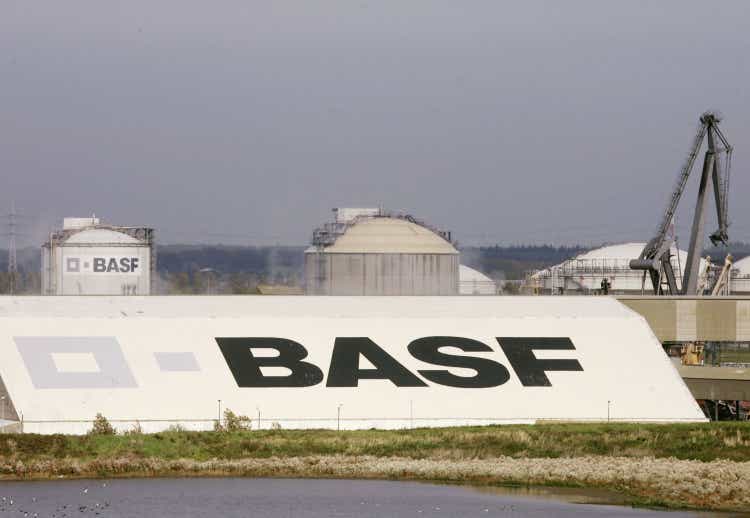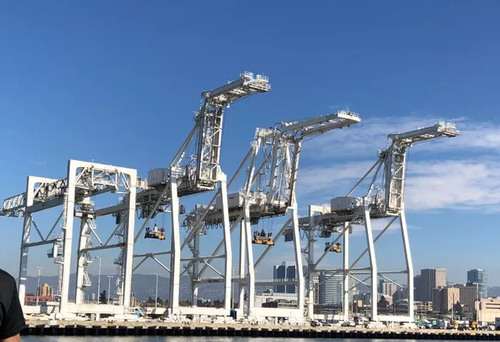Epoxy
April 1, 2022
More From BASF
German Chemical Giant Warns Of “Total Collapse” If Russian Gas Supply Cut
by Tyler DurdenFriday, Apr 01, 2022 – 05:44 AM
CEO of Germany’s multinational BASF SE, the world’s largest chemical producer, has warned that curbing or cutting off energy imports from Russia would bring into doubt the continued existence of small and medium-sized energy companies, and further would likely spiral Germany into its most “catastrophic” economic crisis going back to the end of World War 2.
Company CEO Martin Brudermuller issued the words in an interview with Frankfurter Allgemeine newspaper just ahead of German officials by midweek giving an “early warning” to industries and the population of possible natural gas shortages, as Russia appears ready to firmly hold to Putin’s recent declaration that “unfriendly countries” must settle energy payments in rubles, related to the Ukraine crisis and resultant Western sanctions.
According to Bloomberg he mused that while “Germany could be independent from Russia gas in four to five years” it remains that “LNG imports cannot be increased quickly enough to replace all Russian gas flows in the short term.”CEO of BASF Martin Brudermüller, file image
But in the meantime, Brudermuller described that “It’s not enough that we all turn down the heating by 2 degrees now” given that “Russia covers 55 percent of German natural gas consumption.” He emphasized that if Russian gas disappeared overnight, “many things would collapse here” – given that “we would have high levels of unemployment, and many companies would go bankrupt. This would lead to irreversible damage.” He continued:
“To put it bluntly: This could bring the German economy into its worst crisis since the end of the Second World War and destroy our prosperity. For many small and medium-sized companies in particular, it could mean the end. We can’t risk that!”
The dire warning of coming disaster in the event Russian gas is shut off came in response being questioned over whether it’s at all possible to abandon Russian energy.
Asserting that this issue is not “black and white” – and that the German economy stands on the brink of catastrophe, the BASF CEO said that if this standoff continues to escalate it will “open the eyes of many on both sides”…
Below is the question posed by the newspaper, and Brudermuller’s response:
And what if, for example, Putin’s demand for payment in rubles leads to an immediate stop in gas supplies?
“A delivery stop for a short time would perhaps open the eyes of many – on both sides. It would make clear the magnitude of the consequences. But if we don’t get any more Russian gas for a long time, then we really have a problem here in Germany. At BASF, we would have to scale back or completely shut down production at our largest site in Ludwigshafen if the supply fell significantly and permanently below 50 percent of our maximum natural gas requirement. Minister Habeck has already activated the early warning level of the gas emergency plan.”
Separate sources estimate that at Ludwigshafen alone this scenario would immediately lead to some 40,000 employees being possibly laid off, or at least put on short-time working hours.
He warned further in the interview that many Germans are currently greatly underestimating the consequences of what Russia shutting off the taps would mean… nothing less than a historic crisis:
“Many have misconceptions. I notice that in many of the conversations I have. People often make no connection at all between a boycott and their own job. As if our economy and our prosperity were set in stone.”
He explained that higher prices are already having a huge impact on the food supply given at this point BASF has been forced to reduce the production of ammonia for fertilizer production.
Brudermuller called this “a catastrophe and we will feel it even more clearly next year than this one. Because most of the fertilizers that the farmers need this year have already been bought. In 2023 there will be a shortage, and then the poor countries in particular, for example in Africa, will no longer be able to afford to buy basic foodstuffs.” In a very alarming statement and forewarning, he added: “There is a risk of famine.”
https://www.zerohedge.com/energy/basf-ceo-warns-germany-total-collapse-if-russian-gas-supply-cut
March 31, 2022
BASF in Europe
BASF could stop production if natural gas supplies fall to half its needs – Reuters
Mar. 30, 2022 2:19 PM ETBASF SE (BASFY)BFFAFBy: Carl Surran, SA News Editor3 Comments

BASF (BASFY -2.9%) warns of potential damage to its operations from Europe’s power crunch, saying it would need to stop production if natural gas supplies fall to less than half its needs, Reuters reports.
There is no substitute for natural gas as a raw material or as an energy source, BASF says, and gas shortages would leave it without not enough energy for the chemical production process, and lack of a critical raw material for the manufacture of products.
In Europe, the company says it uses 60% of the gas it buys to generate energy needed in production and 40% as a raw material to produce important basic chemicals and a large number of products for almost all industrial sectors.
BASF has said it plans to increase capex spending every year until 2024, but high energy prices are weighing on its performance, Ellsworth Research writes in an analysis posted recently on Seeking Alpha.
March 31, 2022
BASF in Europe
BASF could stop production if natural gas supplies fall to half its needs – Reuters
Mar. 30, 2022 2:19 PM ETBASF SE (BASFY)BFFAFBy: Carl Surran, SA News Editor3 Comments

BASF (BASFY -2.9%) warns of potential damage to its operations from Europe’s power crunch, saying it would need to stop production if natural gas supplies fall to less than half its needs, Reuters reports.
There is no substitute for natural gas as a raw material or as an energy source, BASF says, and gas shortages would leave it without not enough energy for the chemical production process, and lack of a critical raw material for the manufacture of products.
In Europe, the company says it uses 60% of the gas it buys to generate energy needed in production and 40% as a raw material to produce important basic chemicals and a large number of products for almost all industrial sectors.
BASF has said it plans to increase capex spending every year until 2024, but high energy prices are weighing on its performance, Ellsworth Research writes in an analysis posted recently on Seeking Alpha.
March 31, 2022
Looming Dock Strike
22,000 Union Workers At 29 West Coast Ports May Strike
by Tyler DurdenThursday, Mar 31, 2022 – 10:45 AM
By Dees Stribling of Bisnow National
The international supply chain crisis that has impacted U.S. logistics firms, retailers and consumers could intensify this summer.

West Coast union dockworkers may strike if they don’t come to an agreement to replace their existing contract with marine terminals. The contract is set to expire at the end of June.
Major retail chains have already ordered extra goods from Asia as insurance against a breakdown in contract talks, keeping the goods at newly developed storage yards near the twin California ports of Long Beach and Los Angeles. Such lots allow retailers to move containers more quickly, preventing them from being delayed under piles of cargo at congested ports.
Walmart alone has room for 4,000 shipping containers at the ports’ overflow yards, Pacific Terminal Services Vice President of Commercial Operations Sepehr Matinifar told The New York Times.
Space constraints in the area led to the rise of the new storage yards. By Q2 2021, industrial vacancy near the ports of Los Angeles and Long Beach was below 1%, according to CBRE.
Even with beefed-up orders kept in storage yards, a slowdown or strike by West Coast dockworkers would compound the pandemic-induced supply chain woes that have seen record backlogs of container ships off the ports of Los Angeles and Long Beach waiting to be unloaded.
The International Longshore and Warehouse Union, which represents nearly 22,000 workers at 29 ports along the West Coast, recently put together its contract negotiating team. Nearly three-quarters of those workers are employed at the ports of Long Beach and Los Angeles, the major nexus for goods shipped from Asia to North America.
In 2014, the last time the union and shipping companies negotiated a contract, a labor slowdown brought activity at Pacific ports nearly to a standstill.
https://www.zerohedge.com/economics/22000-union-workers-29-west-coast-ports-may-strike
March 31, 2022
Looming Dock Strike
22,000 Union Workers At 29 West Coast Ports May Strike
by Tyler DurdenThursday, Mar 31, 2022 – 10:45 AM
By Dees Stribling of Bisnow National
The international supply chain crisis that has impacted U.S. logistics firms, retailers and consumers could intensify this summer.

West Coast union dockworkers may strike if they don’t come to an agreement to replace their existing contract with marine terminals. The contract is set to expire at the end of June.
Major retail chains have already ordered extra goods from Asia as insurance against a breakdown in contract talks, keeping the goods at newly developed storage yards near the twin California ports of Long Beach and Los Angeles. Such lots allow retailers to move containers more quickly, preventing them from being delayed under piles of cargo at congested ports.
Walmart alone has room for 4,000 shipping containers at the ports’ overflow yards, Pacific Terminal Services Vice President of Commercial Operations Sepehr Matinifar told The New York Times.
Space constraints in the area led to the rise of the new storage yards. By Q2 2021, industrial vacancy near the ports of Los Angeles and Long Beach was below 1%, according to CBRE.
Even with beefed-up orders kept in storage yards, a slowdown or strike by West Coast dockworkers would compound the pandemic-induced supply chain woes that have seen record backlogs of container ships off the ports of Los Angeles and Long Beach waiting to be unloaded.
The International Longshore and Warehouse Union, which represents nearly 22,000 workers at 29 ports along the West Coast, recently put together its contract negotiating team. Nearly three-quarters of those workers are employed at the ports of Long Beach and Los Angeles, the major nexus for goods shipped from Asia to North America.
In 2014, the last time the union and shipping companies negotiated a contract, a labor slowdown brought activity at Pacific ports nearly to a standstill.
https://www.zerohedge.com/economics/22000-union-workers-29-west-coast-ports-may-strike
